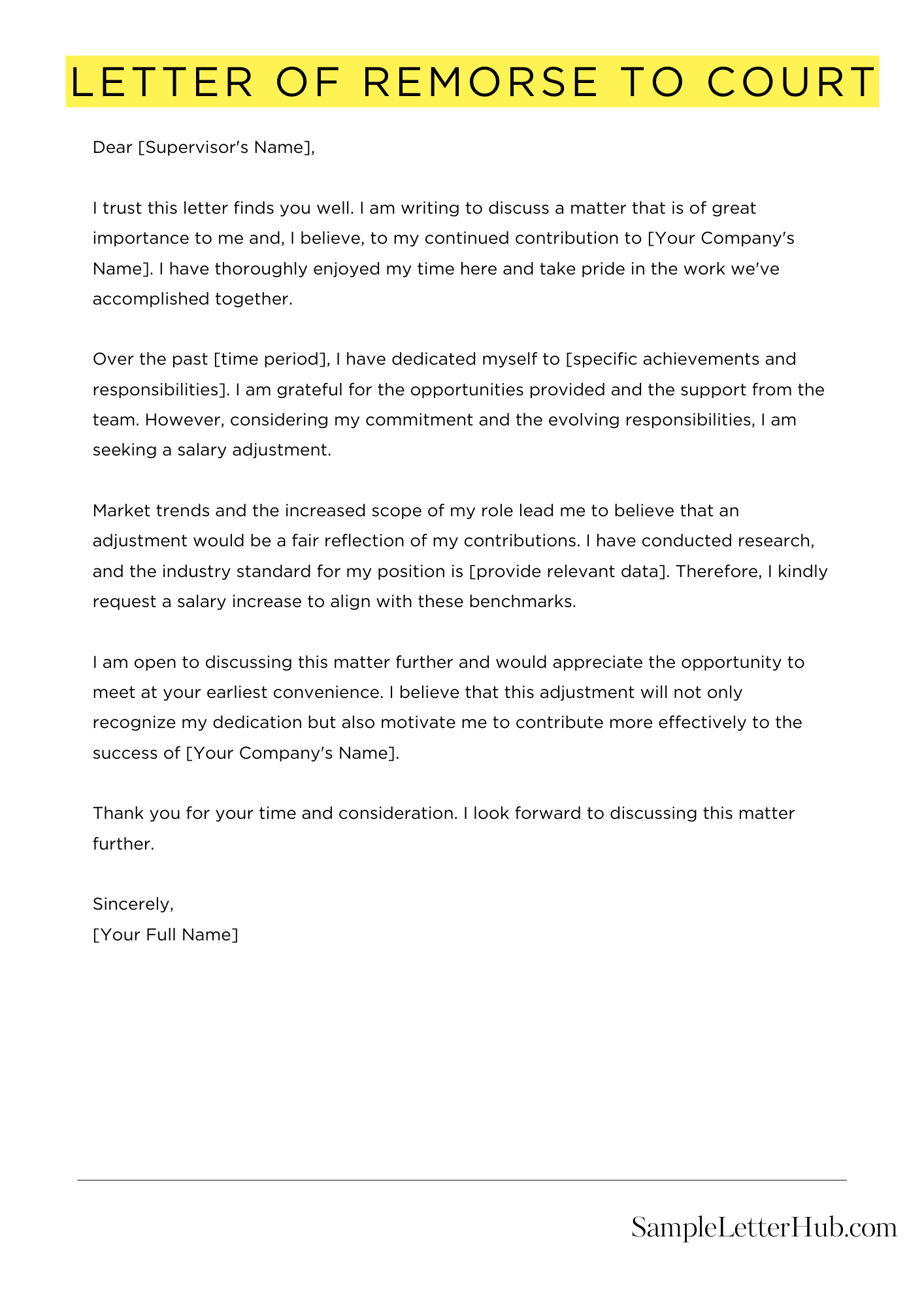A Letter of Remorse to the Court is a formal letter written to express regret and remorse for an offense or wrongdoing. It is typically submitted to the court as part of a sentencing hearing or as a request for leniency. The purpose of the letter is to demonstrate the writer’s understanding of the severity of their actions, their commitment to taking responsibility, and their desire to make amends.
In this article, we will provide you with several templates, examples, and samples of Letters of Remorse to the Court. These samples will cover a range of offenses and situations, and they will provide you with the necessary guidance to write a compelling and effective letter. By using these templates, you can save time and ensure that your letter is well-written and persuasive.
Letter of Remorse to the Court
Honorable Judge [Judge’s Name],
I am writing this letter to express my deepest remorse for my actions that led to my appearance before this court. I understand the gravity of my offense and the impact it has had on the victim, the community, and the court system.
I take full responsibility for my behavior and acknowledge that I made a serious mistake. I was not thinking clearly at the time, and I allowed my emotions to get the better of me. I am truly sorry for the pain and suffering I have caused.
Since my arrest, I have had ample time to reflect on my actions and the consequences they have had. I have come to realize the error of my ways and am committed to making amends for my behavior. I am determined to become a better person and to live a life that is free from crime.
I understand that I have violated the law and that I must be held accountable for my actions. I am prepared to accept the consequences of my behavior and will cooperate fully with the court throughout this process.
I am asking for the court’s mercy and understanding. I know that I have made a mistake, but I am also confident that I can learn from this experience and become a productive member of society.
Thank you for your time and consideration.
Sincerely,
[Your Name]

How to Write a Letter of Remorse to Court
A letter of remorse is a formal document that expresses regret for a past action. It is often used in legal proceedings to ask for leniency or a reduction in sentencing. When writing a letter of remorse to court, it is important to be sincere and specific about your actions and the reasons for your regret.
1. Start with an Introduction
The introduction should briefly state your purpose for writing the letter and identify the specific action or behavior that you are remorseful for.
2. Express Your Remorse
In this section, you should clearly and concisely express your regret for your actions. Avoid using vague or general language. Instead, be specific about what you did wrong and why you are sorry.
3. Explain Your Circumstances
If there were any mitigating circumstances that led to your actions, you can explain them in this section. However, it is important to avoid making excuses or blaming others. Instead, focus on taking responsibility for your own actions.
4. State Your Commitment to Change
In this section, you should state your commitment to changing your behavior and avoiding similar actions in the future. Explain what steps you have taken or plan to take to make this change.
5. Request Leniency
If you are asking for leniency or a reduction in sentencing, you should state your request clearly and respectfully. However, it is important to be realistic in your expectations.
6. Close with a Sincere Apology
The closing paragraph should reiterate your apology and express your hope for a positive outcome.
7. Proofread Carefully
Before submitting your letter of remorse, proofread it carefully for any errors in grammar, spelling, or punctuation. A well-written and error-free letter will make a more positive impression on the court.
FAQs about Letter Of Remorse To Court
What is a Letter of Remorse to the Court?
A Letter of Remorse to the Court is a formal document written by a defendant to express regret and remorse for their actions that led to criminal charges. It is typically submitted to the court before sentencing in an attempt to demonstrate the defendant’s understanding of the seriousness of their offense and their commitment to rehabilitation.
What are the key elements of a Letter of Remorse to the Court?
A Letter of Remorse to the Court should include the following key elements:
- An apology to the victim(s) and the court
- An explanation of the defendant’s actions and the circumstances that led to the offense
- An expression of remorse and regret
- A statement of the defendant’s commitment to rehabilitation and a plan for how they will avoid similar behavior in the future
- A request for leniency from the court
How can a Letter of Remorse to the Court help a defendant?
A Letter of Remorse to the Court can help a defendant in several ways:
- It can demonstrate the defendant’s remorse and understanding of the seriousness of their offense
- It can provide the court with information about the defendant’s background and circumstances that may be relevant to sentencing
- It can help the defendant to avoid or reduce jail time
- It can help the defendant to rebuild their reputation and relationships
What are some common mistakes to avoid when writing a Letter of Remorse to the Court?
Some common mistakes to avoid when writing a Letter of Remorse to the Court include:
- Making excuses for the defendant’s behavior
- Blaming the victim or others for the offense
- Using clichés or generic language
- Being overly emotional or dramatic
- Focusing on the defendant’s punishment rather than their remorse
When should a Letter of Remorse to the Court be submitted?
A Letter of Remorse to the Court should be submitted before sentencing. It is important to give the court time to review the letter and consider its contents before making a decision about sentencing.

